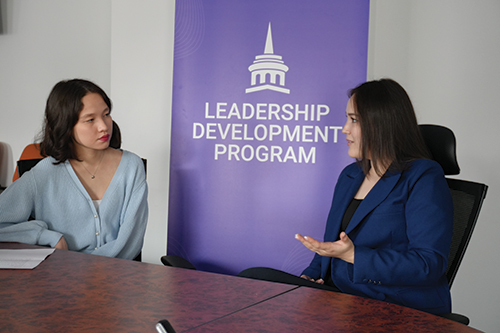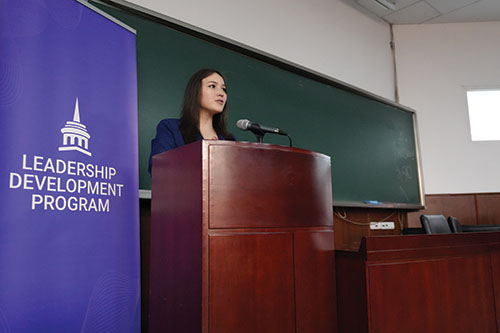We stood in a corridor of the Valikhanov Building, near the Conference Hall on the second floor. Saya Zhaxylyk said the room resembled the leader’s archetype. Serious and determined. She quickly managed to get the hall opened for our interview. We’re in, and a classy-dressed woman starts answering questions with a smile, talking about little 6-year-old Saya who dreamt about getting into KIMEP. Now, she coordinates one of its biggest projects — the Leadership Development Program. The academic program focuses on developing leadership skills among students and consists of three courses, weekly guest lectures, a mentorship program, and an interactive business simulation game. Upon completion, students receive a leadership certificate, or a minor in leadership. This year marks the 15th anniversary of the program.

Q: Firstly, I would like to ask about you and your education. How has your personal life brought you back to KIMEP? How does that experience help you in your current job?
A: My journey with KIMEP began when I was just 6 years old, standing at the main entrance of the Dostyk Building. That was back in the 1990s when KIMEP was an extremely limited edition university, making it incredibly hard to get in.
But I was an ambitious young lady, so I told my parents “I’m going to study here.” I thought, “What should I do then? I need to finish high school with excellent grades and get a scholarship,” and that’s exactly what I did.
Today, I’m proud to be working here. Academically, I hold a bachelor’s degree in finance from KIMEP, two master’s degrees — one from KIMEP and another from the London School of Economics, and currently, I’m a PhD candidate. My professional experience spans nearly 15 years, across local and international organizations. This experience is invaluable in my role, helping me bridge academic knowledge with real-world applications.
Q: How did you end up teaching management?
A: That’s a funny story, actually. From childhood, I wanted to become the president of Kazakhstan. It was my long-term goal, so when I got admitted, I chose the BSS department (Reporter’s note: Public Administration now). However, when I was on my internship in one of the ministries, I understood that the whole governmental system did not match my values. I wanted to be the president because I wanted to change society. I discovered that one of the most powerful ways to influence and to better the world is through education. This realization and value mismatch led me to pursue a different path.
When I was studying, finance was the most challenging specialization at the Bang College of Business, and my classmates told me “Saya, you’re smart, go to finance.” I transferred there, but realized that it again didn’t match my personality. My favorite classes were actually management classes, and I got A+ very easily on them because those were connected to my natural competencies.
I remember some of my favorite professors like Michael Conrad, Paul Davis, Monowar Mahmood, and Alma Alpeissova. Their passion for this specialization and knowledge that they shared, and this perfect match with my nature influenced a lot on my decision to continue my career in management. Perhaps, this could be a meaningful lesson for students: keep exploring and trying different directions until you find your calling.
Q: Some people think that management is an unserious and easy major, and it’s worth studying only if you already have some family business to take in after graduation. Why are they wrong?

A: Management is the backbone of any organization, from small family-owned businesses to large multinational corporations, it doesn’t matter. You can manage your business as you wish, but it won’t be about efficiency and effectiveness. Management is about optimizing limited resources. In today’s turbulent world, organizations need clear structure and direction, strong leadership to provide stability, strengthen resilience, and set the vision. And only true leaders and managers can do that. Without them, we would live in chaos.
Q: According to KIMEP, the Leadership Development Program was initiated in 2010. When did you become the main coordinator of the program and how?
A: That was a pretty smooth process. I joined the LDP in 2019, initially as an instructor. I gradually took on more responsibilities, from teaching theoretical courses to coordinating the program.
Q: Why should KIMEP students register for the program?
A: Many students assume LDP is just about guest lectures, but it’s so much more. It’s unique not only at KIMEP but across Kazakhstan. Beyond guest lectures, it consists of three academic courses: Leadership: Principles and Best Practices, Leadership: Making Principles Work, and Leadership in Action. Three courses are three levels of leadership that we develop among students: individual, team, and organizational.
Besides, each student has their own mentor from top executives and plays a business simulation game, where they make over 150 managerial decisions. So, this is kind of a theory implementation in a safe mode. You are not losing anything, while in the real world, your mistake can lead to losing millions or even more. In cooperation with KIMEP Corporate Development Department and our alumni we digitalized the mentorship experience, making it even more innovative.
Q: This year, KIMEP has seen not only prominent business leaders but also famous social influencers like Aitbek Amangeldi and Moldanazar, which generated a high level of buzz in the New Building corridors, having crowds listening to the speakers even outside the hall. How did you manage to organize that? Did you think there would be such a large crowd?
A: Every guest lecture is a massive project for the whole team that requires weeks, sometimes months of planning. From initial negotiations to securing speakers, organizing logistics, and coordinating security, every detail matters. Also, we have to handle the post-event communication because we are not focusing on the short-term but the long-term relationship with the guest speakers to build a bridge between KIMEP and its external environment, not always necessarily for the LDP but for other projects as well.
Talking about the negotiation process, firstly, KIMEP University has a strong brand, which gives a different approach when communicating with them. Secondly, we have different departments, which I’m thankful for. The Marketing department, Corporate Development Department, Career Center, and Executive Education Center also help us to build links with the speakers. Thirdly, networking is also a crucial thing. We have some people, who are delivering the lecture for a second or a third time.
Once the speaker agrees, main organizational processes start. We have both offline and online promotions to make sure the students are aware of the upcoming event. Then we prepare the certificates, coordinate with the security office to ensure our guest speakers are granted campus access and have parking spaces prepared. As for the large crowds, yes, we anticipated them. For Aitbek’s lecture, we even received numerous requests from individuals outside Kazakhstan who wanted to attend. Can you imagine? That is why we took risk management measures, including strengthening security and providing live streaming.
I would like to thank our audience, especially those students who never miss a single guest lecture. Your dedication means so much to us. After all, everything we do is for our students, and your engagement is what makes it all worthwhile.
Q: So, guest speakers get good relationships with the university, and receive a certificate of membership and merchandise after delivering a lecture. They don’t get paid, do they?
A: No. We can state this officially. We have never paid our guest speakers because our values are higher than money. The main goal of our guest speakers is to share their knowledge with students.
Most of them are at the top of Maslow’s hierarchy, which means they’re genuinely motivated to pass on their experience and values to the next generation and give back to the future of Kazakhstan. It’s also about employer branding — they see students as a key source of talent in the country and want to build connections with their potential future employees. At the same time, they get to raise awareness about their products and services.
In the end, it’s a win-win for everyone.
Q: What is it like coordinating the LDP? What’s a typical day?
A: It’s definitely not a 9-to-6 job.
My day starts with team meetings, ensuring everything from promotional materials to technical equipment is on track. Normally, we also organize calls with guest speakers after work in the evenings or early in the morning to answer their questions regarding the lecture. I also teach my own managerial classes, manage negotiations with potential speakers, and dedicate some time for strategic planning. So, I leave the campus very late in the evening.
Q: Were there any crises in the LDP history? How did you overcome them?
A: COVID-19 was a major challenge, but also an opportunity. While we couldn’t host in-person events, we expanded internationally, inviting speakers from abroad, like a top manager from Singapore Airlines. Another challenge was a drop in student awareness after the Covid, but we revitalized our marketing strategy and successfully rebuilt engagement. For example, inviting prominent social influencers was also strategically planned. Students helped us to promote the program as well, participating in promo videos and alumni testimonials, for which we are very grateful. And now, KIMEP Voice is interviewing us.
Q: What can you advise your students to become better leaders in the future?
A: Develop your soft skills. Technical knowledge is important, but leadership is about communication, negotiation, and decision-making. Work on emotional intelligence, resilience, agility, flexibility, and adaptability. Learn to make decisions thoughtfully and take responsibility for them, whether the outcome is a success or a lesson.

